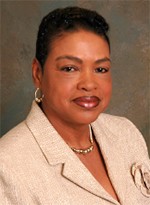AUSTIN—Americans need to “turn the mirror inward” and examine systems that exclude, exploit, oppress or underserve people on the basis of race, a racial equity consultant told participants at a Texas Baptist Christian Life Commission workshop.
Institutional and systemic racism contributes significantly to disparities in society, Joyce James, a Round Rock-based consultant, said at a workshop during CLC Advocacy Day in Austin.
Race predicts outcomes
 Joyce James “Poor outcomes are concentrated in certain geographic communities, and those are usually poor communities and communities of color,” said James, former assistant commissioner of Texas Child Protective Services.
Joyce James “Poor outcomes are concentrated in certain geographic communities, and those are usually poor communities and communities of color,” said James, former assistant commissioner of Texas Child Protective Services.
Whether examining disparities in education, economics, criminal justice or other areas, outcomes remain predictable, she observed.
“Systems need to be held accountable for the trajectory they put people on that is predictable by race,” she said.
Systemic racism can lead to stereotyping and profiling, she noted. For example, misconduct toward minorities by white police officers is attributed to “a few bad apples,” but young black males as a whole tend to be viewed as dangerous, she said.
“There is a tendency to see black behavior as collective and a tendency to see white behavior as individual,” she said.
Fix broken people or broken systems?
Well-meaning individuals put into place systems to “fix broken people,” but society needs to “go upstream against the current” and examine root causes, James insisted.
“Fixing broken systems” requires acknowledging the inherent privilege held by those who created the systems, she asserted.
“White have the best outcomes, because the systems were created by whites, for whites,” James said.
When well-intentioned people sought to include non-whites in the system, they tended to focus on equality rather than equity, she insisted.
“Equality only works if everybody starts at the same place and needs the same things,” James said.
Equity, on the other hand, takes into account who is burdened most and who benefits most, she noted.
“Using an equity lens allows us to uncover the policies, practices and behaviors that sustain unequal outcomes,” she said, explaining equity considers the factors necessary to enable people in a given situation to achieve their full potential in life.















We seek to connect God’s story and God’s people around the world. To learn more about God’s story, click here.
Send comments and feedback to Eric Black, our editor. For comments to be published, please specify “letter to the editor.” Maximum length for publication is 300 words.